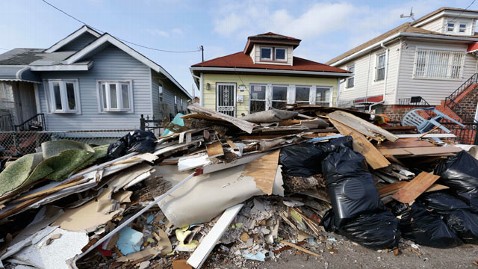
(ASSOCIATED PRESS)
Seventy-nine days after Hurricane Sandy slammed into the Northeast, the House of Representatives voted this evening to approve about $50 billion of additional relief for the region pounded by the storm.
The measure passed 241-180, mostly behind Democratic support, winning 49 votes from Republicans and 192 votes from Democrats. Just one Democrat opposed the legislation, while 179 Republicans voted against it.
The base bill, known as the Hurricane Sandy Disaster Relief Act, included about $17 billion to fund immediate and critical needs for Sandy victims and their communities. An amendment offered by New Jersey Republican Rep. Rodney Frelinghuysen to provide an additional $33 billion for disaster relief also passed, bringing the total amount of relief closer to the Obama administration’s emergency supplemental request, which called for $60.4 billion in total relief.
The Senate still must approve the legislation before President Obama can sign it into law.
An amendment offered by South Carolina Republican Rep. Mick Mulvaney to require all funding in the disaster package to be offset fell well short of the votes required to change the bill, 162-258.
Democrats and Republicans from the storm-ravaged region shared a common frustration over members who opposed to the relief package.
“To use this funding as a political pawn in a game over the role of government and budgetary debates is shameful,” New York Democratic Rep. Elliot Engel wrote in a statement shortly after the vote. “The first order of business for the federal government is to protect our citizens, and helping them recover from the tragedy of a natural disaster is one of those times.”
“I am pleased that the House of Representatives has finally passed legislation to help the victims of Hurricane Sandy,” Rep. Jon Runyan, R-N.J., stated after the vote. “I am hopeful that the Senate will quickly debate and pass this bipartisan legislation so that families in New Jersey and New York will not have to continue to wait for the aid they need.”
The governors of New Jersey, New York and Connecticut, the three states hit hardest by the storm, had all angrily criticized Republicans in the House for deciding not to vote on an aid package passed by the Senate in December, but after the measure’s passage tonight issued a joint statement thanking the House.
“We are grateful to those members of Congress who today pulled together in a unified, bipartisan coalition to assist millions of their fellow Americans in New Jersey, New York and Connecticut at their greatest time of need,” Gov. Chris Christie, N.J.; Gov. Andrew Cuomo, N.Y.; and Gov. Dannel Molloy, Conn., wrote in the statement.
“The tradition of Congress being there and providing support for Americans during times of crisis, no matter where they live across this great country, lives on in today’s vote in the House of Representatives,” they wrote. “We anticipate smooth passage when this package moves back to the Senate for final approval and for this long-awaited relief to finally make its way to our residents.”
Nevertheless, there were still many lawmakers who opposed the package because they felt it contained non-emergency spending.
“The final version passed here tonight includes billions in pork and unrelated spending that we cannot afford while Americans are struggling to make ends meet,” Rep. Steve Pearce, R-N.M., wrote in a statement. “Hurricane Sandy victims need a simple, responsible aid package, and nothing more. Our nation is facing a debt crisis: it’s time for Washington to stop using important bills to fund its own political projects.”
Congress has already approved $9.7 billion for flood insurance on Jan. 4. The House also passed a separate bill without opposition Monday evening, the Sandy Recovery Improvement Act, to speed up and streamline federal disaster recovery programs.
After the House voted Jan. 1 on the “fiscal cliff” deal, House Speaker John Boehner decided not to vote on any relief during the 112th Congress. Republicans and Democrats from the region revolted until Boehner held a private meeting with angry Republican members, during which he promised to make Sandy relief a priority in the 113th Congress.
The legislation was opposed by numerous leading conservative interest groups, including Heritage Action, Americans for Tax Reform, and the Club for Growth, which all warned Republicans not to support the measure.









